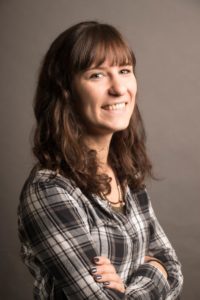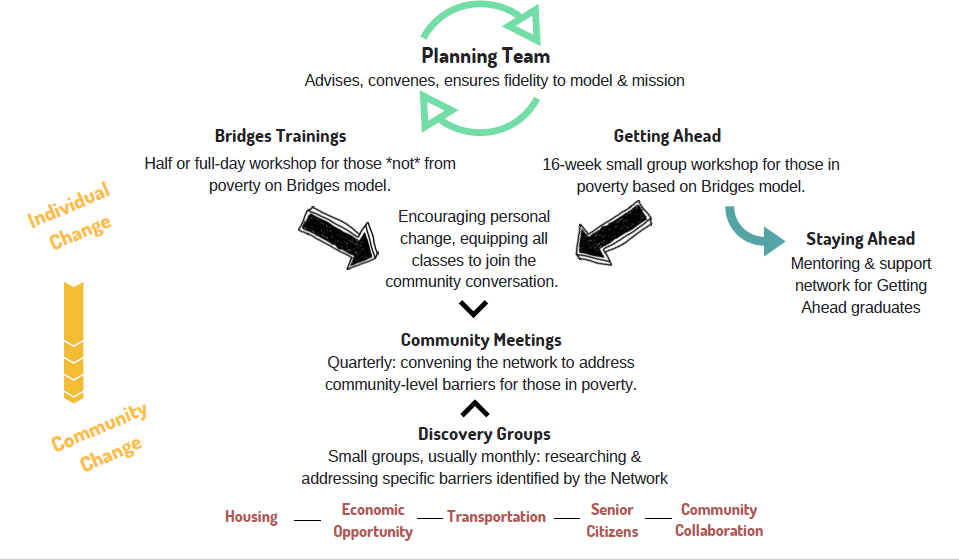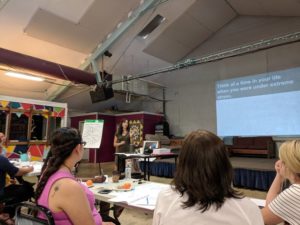‘Poverty can be hard to talk about.’ This is how SCCON starts the conversation
 September 23, 2019
Category: Column, Featured, Medium, Purpose
September 23, 2019
Category: Column, Featured, Medium, Purpose
I am currently serving as the executive director of a small social service nonprofit in Southern Chester County. Recently, I participated in a Bridges out of Poverty training with members of my staff and my board. While I had expected that the experience would be eye-opening for my board, I had not expected my staff members to be equally impacted.
After all, they work closely with clients experiencing poverty every day. The training challenges preconceptions about poverty people don’t even realize they hold.
Following the workshop, I spoke with the presenter, Kate Uhler, about her experiences. Uhler is the executive director of the Constellation Network, an organization founded to support leaders and strengthen networks for the common good in Southern Chester County.
One of the projects she works with is the Southern Chester County Opportunity Network (SCCON), a community-wide initiative made up of a growing group of people who want to see poverty addressed in comprehensive, collaborative ways in the community. SCCON’s work is based on the Bridges Out of Poverty model — a framework for understanding poverty through the lens of economic class and addressing it in a comprehensive way. It asks all sectors of the community — business, nonprofit, education, local governments, etc. — to come to the table and engages those in poverty as problem solvers.
“The magic of this process,” Uhler offered, “is in getting everyone speaking the same language. Poverty can be hard to talk about, especially for those experiencing it. The Bridges framework allows for people with different political and economic backgrounds to converse more easily about the issues, and to find solutions together. It’s hard to negate someone’s experience when you have a direct relationship with them.”
Creating those relationships is one of the main goals of SCCON, and the Bridges training is just one of three interrelated programs which work towards that goal. The second program is Getting Ahead.
“Bridges is typically for people with no direct experience of poverty,” Uhler said. “The Getting Ahead program is for people who are currently experiencing poverty in their lives. The typical group is about 10-12 people who are stable enough in their lives that they are able to attend a 3-hour class once a week for 16 weeks. Participants in the Getting Ahead groups focus on building relationships, resources, and hope for the future. The groups also change how people see themselves. They feel less helpless, more empowered, and they now have a seat at the table to be part of addressing an issue larger than themselves.”
All of this comes together when those who have graduated from Getting Ahead and those who are committed to supporting them meet to discuss the barriers and opportunities to moving out of poverty in our community.
Three different Discovery Groups have been formed to address the issues Getting Ahead graduates have identified as crucial to breaking the cycle of poverty in our area, and the graduates are encouraged to participate in those groups, as are other community members from all different backgrounds. These three groups focus on Transportation, Housing, and Community Collaboration. The work of the Discovery Groups is shared in quarterly community meetings which take place in January, April, July and October.
“Having people from all aspects of the community in one room, all addressing the same issues, helps people to realize that we all have a role to play in making things better,” Uhler said.
SCCON’s Community Meetings are open to everyone and are held on the third Tuesday each quarter from 6-7:30 p.m. The next community meeting will take place on Tuesday, October 15 from 6-7:30 p.m. at West Grove United Methodist Church.
Trending News












